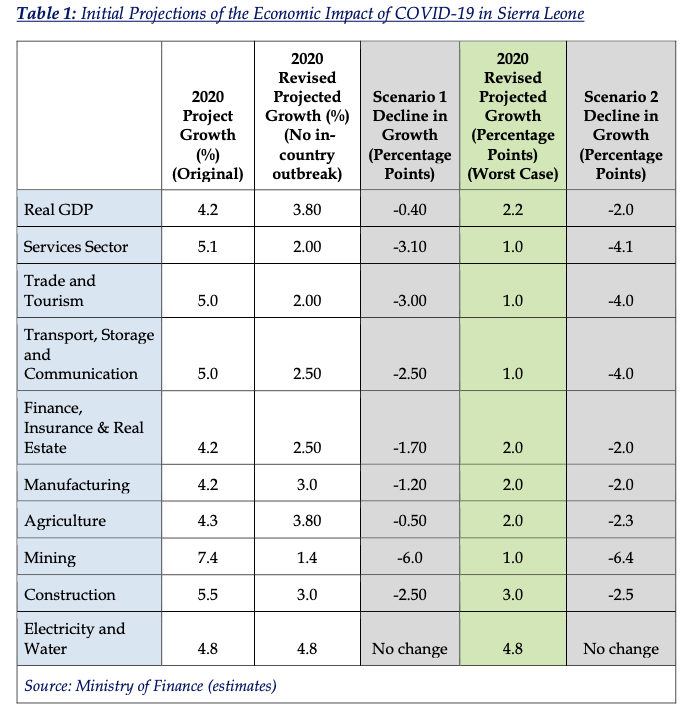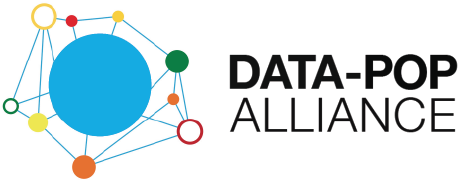SIERRA LEONE
Information last updated: May 13, 2020
- Total population: 7.7 M
- Population +65 yo: 3%
- GDP Per Capita: 1,704 USD
- Informal employment: Not available
- First registered case: 31 March
- Hospital beds: 2.20 (per 1,000 people)
Sources: TheWorld Bank and WHO (Population over 65 years old, Informal employment, GDP-PPP, Hospital beds).
Status
On March 24th, the President of Sierra Leone declared a 12-months State of Emergency in the nation. Sanitary best practices have been imposed in the country and two lockdowns took place in Freetown (April 5th – 7th; May 3rd – 5th). A partial lockdown has been imposed on April 11th and will be prolonged until further notice.
Response set up and capacity
he Ministry of Health and Sanitation (MoHS) is the main entity in charge of the response to Covid-19. In Freetown, the Freetown City Council also provided a Covid-19 Preparedness and Response Plan to tackle challenges raised by the crisis.
A set of international and local actors provide further support to the country; The IMF and the World Bank, as well as the Bank of Sierra Leone provide financial support to the country. Multiple UN agencies give technical support to the local government and populations, while a set of international and local partners carry prevention and awareness activities across the country.
In view of the damages left by the recent Ebola crisis and the low capacity of the healthcare system, the Government of Sierra Leone decided to implement prevention measures before the first case of Covid-19 was confirmed in the country.
Stakeholder Mapping
Entities / Organizations
• Government of Sierra Leone
• Ministry of Health and Sanitation (MoHS)
Additional actors
• Financial support:
The Bank of Sierra Leone, IMF, the World Bank.
• Technical support:
United Nations agencies (UNDP, IOM, UNICEF), the WHO, etc.
• Prevention and awareness activities
by Partners in Health (PiH), AAD-SL, KADDRO, etc.
Mitigating factors - What is being done?
- March 13: The Ministry of Health and Sanitation advises against overseas travels and recommends good hygiene practices in view of the spread of Covid-19 around the world. Furthermore, the Government sets up 3 health facilities in the country with testing capacity.
- March 16: Travelers entering Sierra Leone and presenting Covid-19 symptoms are taken to isolation facilities for investigation. A mandatory quarantine is implemented for travelers coming from countries with 50 or more confirmed cases of Covid-19.
- March 18: The Government imposes stricter measures in the nation, including:
- Military deployed to land borders and airports to enhance security and enforce compliance to health directives.
- Foreign travels by government officials are suspended.
- Citizens are encouraged to not leave the country, especially to those with high rates of infections.
- Citizens are encouraged to spread information and awareness about the virus.
- Citizens are encouraged to avoid physical contacts, and practice social distancing.
- Citizens with flu-like symptoms are encouraged to report to the phone line 117.
- Citizens must comply with sanitary and hygiene best practices, such as avoiding handshakes, hugs, direct contact with people, washing hands etc.
- Businesses and public institutions must provide hand-washing stations, and ensure toilets and common areas are regularly disinfected.
- Public transport providers must avoid congestion in transports and provide hand sanitizers to users.
- March 19: Release of the Environmental and Social Commitment Plan (ESCP) in response to the Covid-19 crisis.
- March 24: The President declares a State of Public Emergency for 12 months. The Quick Action Economic Response Program (QAERP) is released and underlines the response of the Sierra Leonean Government to the Covid-19 crisis, under three possible scenarios; This document presents economic, health, and sanitary responses of the Government, including fiscal stimuli, financial responses, and support to various sectors of the economy.
- March 27: Closure of land borders, except for essential commodities.
- March 31: First case of Covid-19 is confirmed. Education institutions close and large gatherings (over 100 people) are discouraged.
- April 5: First lockdown is imposed by the Government until April 7th.
- April 11: Partial lockdown is imposed, restriction inter-district travels, except for essential reasons. A national curfew is imposed from 9pm to 7am. It is prolonged until further notice.
- May 1: Re-opening of commercial banks on May 1st and May 2nd.
- May 3: 3-day, nationwide, lockdown, effective until May 5th.
Risks, vulnerabilities, obstacles
- Health: Sierra Leone has a fragile healthcare system. As of April 9th 2020, there were 130 hospital beds available for Covid-19 patients, 15 beds in intensive care units, and 200 oxygen concentrators. Furthermore, life expectancy at birth in Sierra Leone was only at 54 years old in 2017, and around 40% of the population does not have access to an improved water source. Sanitation challenges in the country are detrimental to a large part of the population, vulnerable to infections and parasites and making it difficult for part of the population to comply with hygiene standards and making them less resilient to diseases. Nevertheless, the country learnt from the recent Ebola outbreaks and implemented measures to counter Covid-19 three weeks before the first case was confirmed, applied isolation measures early on.
- Food security: According to the United Nations, 90.8% of the population of Sierra Leone suffers from moderate or severe food insecurity. Freetown City Council acknowledges that the lockdown measures in place may increase food insecurity, particularly in informal settlements and is providing unconditional cash transfers to the most vulnerable.
- Macroeconomic impact: The Government of Sierra Leone expects a negative shock on economic growth, and revised growth projections downwards to 3.8% in the best-case scenario to negative growth rates in the worst-case scenario. Further negative impacts are expected in the financial and business sector, as well as regarding the fiscal deficit (loss of at least Le 583 bn). In response to these upcoming challenges, the Government devised the Quick Action Economic Response Programme (QAERP) in addition to sanitary measures. This plan aims at providing safety nets to the hardest hit businesses, maintain an adequate stock of commodities, provide safety nets to vulnerable populations, and provide assistance to workers. This program is expected to provide great relieve to the country but may also widen the financial gap and lead to debt unsustainability.
- Economic impact: The Government of Sierra Leone expects the trade and tourism, as well as transport sectors to be hit the hardest, after the services sector. Projections are shown on table 1. The adverse effects on the trade sector are expected to negatively impact the currency. Furthermore, mining activities may be impacted with the decreased demand for minerals globally, and on which Sierra Leone’s trade balance relies heavily.
Potential actions and demands
- The Employer’s Federation and the Labor Congress of Sierra Leone ask the Government to establish a national committee comprising the private sector, academics, trade unions, scientists and community groups. This national committee would be used to develop social and economic responses to the crisis. Furthermore, both organizations demand more financial help for businesses, including zero-interest loan programs, grants, a flexible tax regime, and a minimum wage of Le 600,000.
- Violent disturbances occurred across Sierra Leone in the past weeks; 18 people died in 3 riots in different parts of the country. The President accused the Opposition of triggering violence, accusations which were denied by the All People’s Congress party. The United Nations called for solidarity amongst the parties and for the country to unite in its response to Covid-19.
Key resources
- Ministry of Health and Sanitation: Covid-19 Global Update https://mohs.gov.sl/covid-19/
- Office of the President https://statehouse.gov.sl/
- COVID-19 Quick Action Economic Response Programme (QAERP) http://www.statistics.sl/images/2020/Documents/GoSL_COVID_19_Quick-Action-Economic-Response-Programme.pdf
- Freetown City Council https://fcc.gov.sl/
- WHO: COVID-19 Related Materials including situation report https://www.afro.who.int/publications/covid-19-related-materials-including-situation-reports
Contributor(s): Sarah Bodart.



